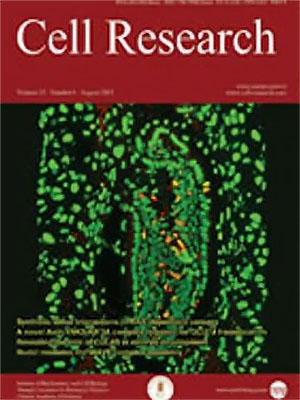
Volume 15, No 9, Sep 2005
ISSN: 1001-0602
EISSN: 1748-7838 2018
impact factor 17.848*
(Clarivate Analytics, 2019)
Volume 15 Issue 9, September 2005: 695-703
ORIGINAL ARTICLES
p53-independent pRB degradation contributes to a drug-induced apoptosis in AGS cells
Yan JIN1, Wai Keung LEUNG2, Joseph Jao-Yiu SUNG2, Jia Rui WU1*
1Laboratory of Molecular Cell Biology, Institute of Biochemistry and Cell Biology, Shanghai Institutes for Biological Sciences,
Chinese Academy of Sciences, 320 Yue-Yang Road, Shanghai 200031, China
2Department of Medicine and Therapeutics, The Chinese University of Hong Kong, Prince of Wales Hospital, Shatin, Hong
Kong SAR, China
Correspondence: Jia Rui WU(wujr@sibs.ac.cn)
The retinoblastoma (RB) tumor suppressor protein, pRB, plays an important role in the regulation of mammalian cell cycle. Furthermore, several lines of evidence suggest that pRB also involves in the regulation of apoptosis. In the present study, the degradation of pRB was observed in apoptotic gastric tumor cells treated with a new potent anti-tumor component, tripchlorolide (TC). The inhibition of pRB degradation by a general cysteine protease inhibitor IDAM resulted in the reduction of the apoptotic cells. Furthermore, the survival of the gastric tumor cells under the TC treatment was enhanced by an over-expression of exogenous pRB. These results suggest that the pRB degradation of the gastric tumor cells under the TC treatment involves in the apoptotic progression. In addition, the same extent of TC-induced pRB-degradation was detected in the gastric tumor cells containing a p53 dominant-negative construct, indicating that this kind of pRB degradation is p53-independent.
FULL TEXT | PDF
Browse 2032


